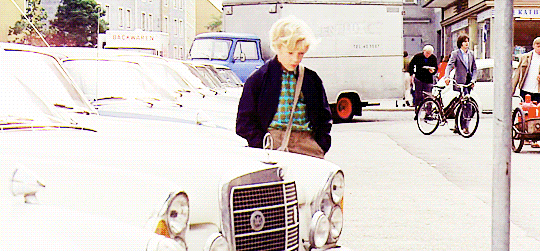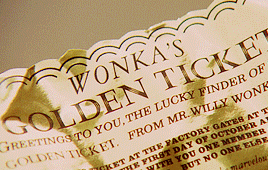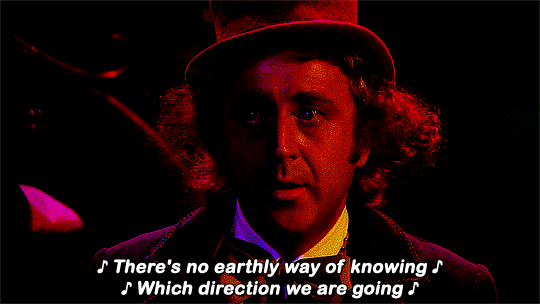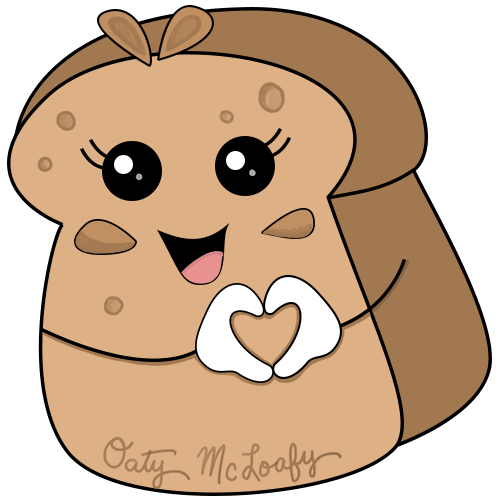“Everybody aboard, you’re going to love this, just love it.”

Both Willy Wonka and the Chocolate Factory and Charlie and the Chocolate Factory are on this list. This is the only instance that both the original and its remake are featured. These movies are based off of Roald Dahl’s novel “Charlie and the Chocolate Factory” and each change the original source material in its own way – Charlie by adding backstory to Wonka, and Willy Wonka by changing Wonka’s character into a deranged sadist that seems to take pleasure in torturing his guests. But we’re not there yet, let’s poke around in this world first before I rip into Wonka.
The Wonka Chocolate Factory is famous worldwide for their confectionary marvels. Children in Wonka’s hometown flock to Bill’s Candy Shop to check out Wonka’s latest creations, and Mr. Bill basically chucks it all at their face for free while singing a sort of creepy ditty about being a candy man.
All I can think of when I watch this scene is how hopped up on sugar these child actors must have been.
Meanwhile, the hero of the story, Charlie Bucket (which is the best name for a character in all of literary history and gives Lazar Wolf a run for his money), comes from a poor family and can’t afford the admission to Mr. Bill’s Diabetes Deluge. If that weren’t enough disappointment, he also has to walk by Wonka’s factory, where he wistfully gazes through the gates at the building until a very ominous man with the best line delivery in the entire movie informs Charlie that “NoBoDy EvEr GoEs In AnD nObOdY eVeR cOmEs OuT”.

Charlie lives with his mother, a laundress, and his four invalid grandparents who haven’t left their iconic collective bed in twenty years. The novel itself is fairly low stakes, but does depict Charlie’s family’s position in life as wholly destitute. It describes how emaciated Charlie looked because he was a growing boy without food, and how selfless he was by refusing to eat his family’s portions when they were offered. I was thankful they decided not to translate these particular facts to film, but instead they removed the father character and forced Charlie to work to support his family, essentially robbing him of his childhood. Him and grandpa Joe even bicker because Charlie wants to step up and pay for his tobacco, which is a bizarre thing for a child to be forced to advocate for, even in the 1970s.

Charlie tells Grandpa Joe about his encounter with the weirdo in front of Wonka’s, and Grandpa Joe educates Charlie on the history of the factory. After Wonka discovered there were spies working for his competition getting intel from his factory, he fired all the workers and closed it off completely. In present day Wonka announces a competition – he has hidden 5 golden tickets in his Wonka bars, and the children who find them will win a lifetime supply of chocolate. Additionally, they will be allowed on the Wonka factory premises with Willy Wonka himself guiding them on a tour of his chocolate factory.
Charlie, of course, doesn’t have the money to purchase several chocolate bars, so he can only watch with envy as Augustus Gloop, a glutton, finds the first bar. The envious Veruca Salt, the daughter of a rich peanut factory owner, gets the second spot after her father forces his employees to deshell Wonka bars until a golden ticket appears. Golden ticket number 3 is found by the prideful and focused champion gum chewer Violet Beauregarde, and the fourth ticket is awarded to lazy and wrathful Mike TeeVee, who, as his namesake suggests, spends the majority of his time awake viewing the television and is subsequently obsessed with the firearms his favorite pictures feature.

The vignettes of people around the world trying to find the golden tickets are genuinely funny. Between a computer programmed to predict where the tickets are located telling its operator it won’t divulge that information because that would be cheating, to a woman debating if she really wanted to pay her kidnapped husband’s ransom with a case of Wonka bars, it does a great job at illustrating how Wonka-crazy the entire world was.
Charlie is despondent when the last golden ticket is found, but his luck almost immediately changes when he finds some money laying in the street. He goes to Bill’s to buy some candy, and on his way home with his new bounty, overhears the last ticket found was a fake. The concept of the forged ticket isn’t a feature of the book, but is a feature of the two movie adaptations. I’m positive its inclusion was intended to add a bit of drama into the story that has little conflict for Charlie other than his extreme level of poverty. To Charlie’s surprise, the Wonka bar he bought with his found money contains the last golden ticket.

On his way home he runs into Mr. Slugworth, the owner of another candy company, who asks Charlie to steal an everlasting gobstopper from Wonka in exchange for $10k. This is an insane amount of money for someone like Charlie, but he doesn’t seem to pay this offer much mind. When Charlie finally returns home to tell his family the good news, Grandpa Joe surprises everyone when he rallies enough to climb out of bed and waltz around the room to prove he’s fit enough to accompany Charlie on the tour.
The morning of the tour, Charlie and the 4 other children arrive with their parent chaperones. Wonka welcomes them inside and forces them to sign a contract, which I assume absolves him of any wrongdoing in case anybody gets injured. Everybody acts as if contracts are a newfangled thing that only suckers agree to, but each of the children put ink to paper to allow themselves admittance to the factory. I’m not sure how legally binding an agreement with an underage child is, but it’s the 1970s, so who knows…

The factory itself is a maze of funhouse tricks, with each room designed to unsettle the guests a little more as they progress deeper into the building. Their discomfort is rewarded though when Wonka finally leads them into the chocolate room.
Gene Wilder singing this song while baiting the kids with access to the room before almost hitting them with his cane is his entire character in a nutshell. Just a detached, wealthy company owner who likes to withhold joy from children under the threat of violence. For as much as I’ll quip about Wonka being kind of a terrible person, Gene Wilder is a fucking legend in this.
Also, the chocolate room looks so freaking awesome, especially considering these are practical effects paired with really good set design. While the chocolate river looks slightly… distasteful (and allegedly smelled terrible because the cream they mixed in it curdled), the rest of this is appetizing as fuck and I would have gone HAM in a room like this as a kid and ate jelly with my hands out of a bucket, too.
We’re then introduced to Wonka’s biggest secret – the Oompa Loompas, a race of people that Wonka literally upended for free labor in his factory under the guise of “rescuing” them from predators. What kind of white savior nonsense…
ANYWAY, while the guests are fascinated with Wonka’s workforce, Augustus decides to help himself to the contents of the chocolate river, falls in, and gets sucked up into a pipe that leads directly to the fudge room. The Oompa Loompas sing a song about not eating too much shit, and Wonka decides to hand wave this away and usher the rest of the group onto his boat for the next part of the tour.

The child actors apparently had no idea what was going to happen on this boat ride and their reactions of horror as Gene Wilder starts to manically sing is actually genuine. The mindfuck Willy Wonka subjects these poor people to really makes me wonder if they “won” anything.
The boat’s final destination is the invention room, where Wonka shows the kids his latest creation: the everlasting gobstopper. He makes them promise not to share it with anybody, and all the kids halfheartedly agree and take their ten thousand dollar candy. Wonka then taunts Violet with a stick of gum flavored like an entire 3 course meal, and she easily takes the bait.
I love this Oompa Loompa song so much for the mere fact they’re rolling around a inert mannequin dressed to look like a human/blueberry hybrid.
One of the other major deviations from the book was the following scene where Charlie and his grandfather almost fucking get chopped to pieces by a ceiling fan because they sample some of Wonka’s fizzing lifting drink and float higher and higher into certain peril. They manage to escape this fate by burping their way back down and are not immediately caught by Wonka, but it makes Charlie as guilty as every other child who is on this factory tour. And what is he or any other child guilty of really? Not being able to restrain themselves from eating candy on a tour of a candy factory?

The other two children whose actual hubris get them in trouble are Veruca and Mike. Veruca tries to have her father buy a goose that lays golden eggs, which Wonka refuses to sell. Veruca throws a tantrum, and the egg quality control mechanism determines she’s a “bad egg” and drops into the garbage chute. The book has her try to buy a nut shucking squirrel, but I appreciate a good pun, so I’m fully on board with this change.
Next, Mike TeeVee wants to be the first human to travel over television waves, and in turn gets shrunk to the size of Thumbelina. Again, can’t really fault a literal child for not having impulse control, or the critical thinking skills to understand the consequences of being disassembled and reassembled on a television screen. I mean, I can’t say I miss the violent brat, but I wouldn’t say his excessive viewing of television made him a dumb zombie who wanted to be a part of the picture.
With Charlie the only one left, he is then surprised when Wonka acts coldly toward him and decides not to give him the lifetime supply of chocolate. When pressed for a reason why he’s withholding Charlie’s bounty, Wonka gives him and Grandpa Joe an earful for drinking his fizzy lifting drink and smearing their dirty hands all over his sterilized environment. This incites Grandpa Joe, calling Wonka a crook and storming out of Wonka’s office and vowing to give Slugworth the everlasting gobstopper as revenge.

Yell at me more, candy daddy.
Charlie doesn’t feel the same way as his grandfather and gives the gobstopper back to Wonka before leaving. Wonka’s demeanor does a complete 180 and he tells Charlie he’s passed a test he didn’t know he was taking. They board the Wonkavator and thankfully don’t fulfill Wonka’s suicide pact by successfully launching the glass elevator out of the building. Once flying around outside, Wonka tells Charlie he’s won the grand prize – his entire chocolate factory. Not only that, but Wonka would also take care of Charlie’s family, lifting them out of poverty and ending their food insecurity. The end.

I know a lot of people around my age that absolutely love this movie, specifically Gene Wilder’s depiction of Willy Wonka, so it pains me to inform you that the author of the novel was less-than-pleased at this rendition of his tale, and also with Wilder’s interpretation of the titular character.
Wilder only accepted the role if the following scene of him faking out the children with a limp could be included, because it established that Willy Wonka could not be trusted. The movie’s portrayal of Wonka as a gaslighting daddy was I think where Roald took the most issue with it, and most likely why I, as a child, found it hard to connect to.

Willy Wonka is scary in this movie, like The Joker made for tater tots. He spends the entire factory tour traumatizing the children he invited there, and at the end of the movie screams at Charlie and his grandfather for drinking a beverage. When Charlie gives up the gobstopper, Wonka’s entire countenance changes, rewarding Charlie with the grand prize because he deems Charlie trustworthy. While they’re celebrating in the elevator, I’m just waiting for the other shoe to drop. This happy Wonka is not the Wonka we’ve been witness to the last hour, so it’s hard as a viewer to let my guard down and take his offer at face value.
He hugs Charlie and offers him the world, but before then, Wonka doesn’t seem too particularly concerned with the children’s well-being. In fact, I’m not sure he even likes children? The only reason he wanted to bequeath his factory to one is because he’d easily be able to convince them to run it in a way that Wonka intended. No fully-formed brains adding new ideas or questioning processes, just unformed gray matter for Wonka to pump his influence into. And that’s not an issue with this adaptation, as the novel ends this way as well. But Slugworth and the gobstopper test are additions from the screenplay, presumably to prove the other children are unworthy of Wonka’s grand prize. Unfortunately, the side effect of this is making Wonka further look like a scheming dick.
I’m an old, curmudgeonly 30-something who feels no joy, so do not take my criticisms of the character of Willy Wonka as an indication of the quality of this movie. This is an excellent children’s story that inspires an excessive amount of imagination. It’s a world where your wildest candy dreams are a reality in Wonka’s factory. There’s also the added benefit of watching a bunch of wacky ways in which children could potentially mutilate themselves, but come out completely unscathed. Where I think it might fail is in its moral messaging on moderation – if you excessively eat chocolate, chew gum, demand things, or watch TV, bad things will happen to you. I don’t think any kid came out of this movie a better person, but I’m sure they had fun watching it.
Charlie and the Chocolate Factory will come later this week, god help me.

Trackbacks/Pingbacks